
private-llm-qa-bot
None
Stars: 262
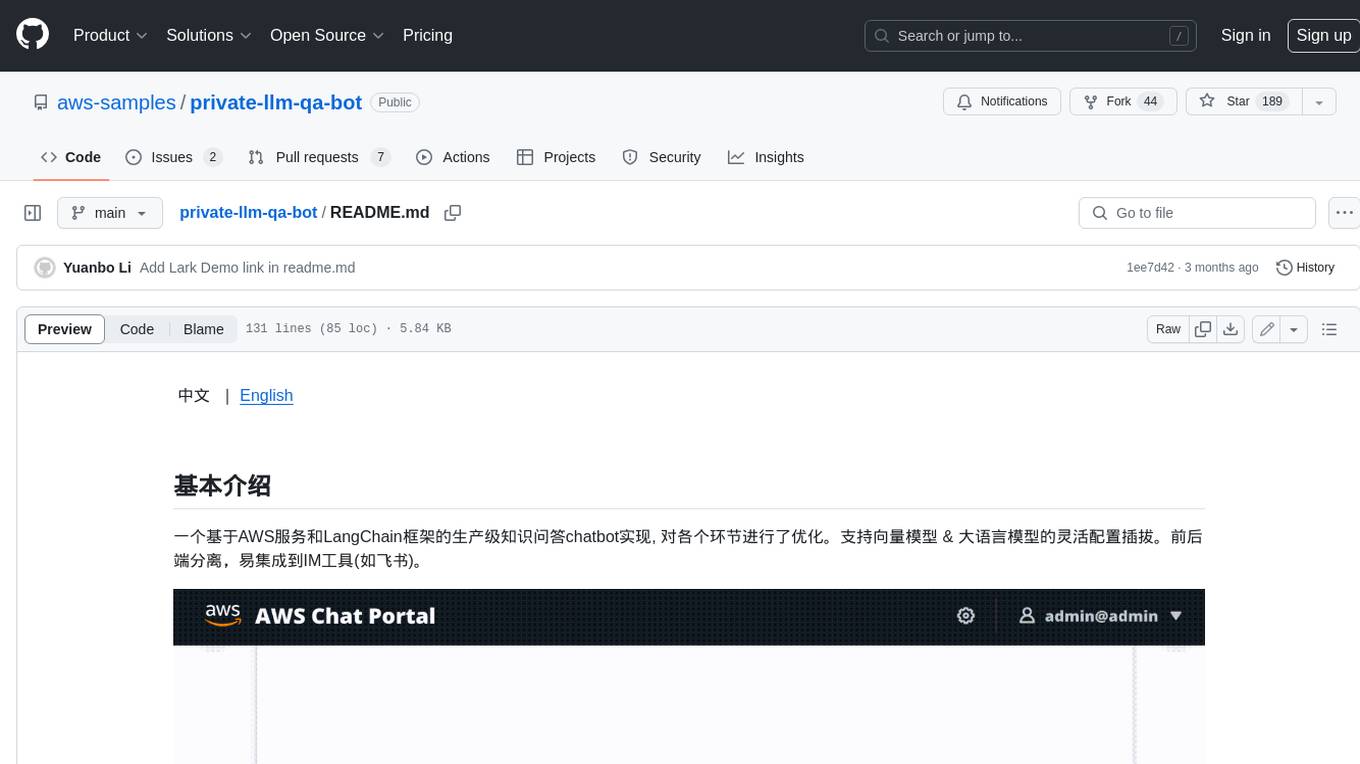
This is a production-grade knowledge Q&A chatbot implementation based on AWS services and the LangChain framework, with optimizations at various stages. It supports flexible configuration and plugging of vector models and large language models. The front and back ends are separated, making it easy to integrate with IM tools (such as Feishu).
README:
 中文  | English 
一个基于AWS服务和LangChain框架的生产级知识问答chatbot实现, 对各个环节进行了优化。支持向量模型 & 大语言模型的灵活配置插拔。前后端分离,易集成到IM工具(如飞书)。
- 部署文档
- Workshop(step-by-step)
- workshop地址 (注意:部署需参考飞书文档,workshop中部署的为一个不更新的branch,主要帮助不熟悉AWS的用户更容易的上手)
-
代码介绍
需重点关注code/, deploy/, docs/, notebooks/ 这四个目录,code/目录中按照模块拆分了7个子目录,deploy/用于设定cdk部署资源的,docs/提供了知识/fewshot文件范例, notebooks/中提供了各类模型部署/微调/可视化的一些notebook文件,帮助你更深入的优化效果。
. ├── Agent_Pydantic_Lambda # Agent API实现范例(submodule) ├── chatbotFE # 前端代码(submodule) ├── code │ ├── main/ # 主逻辑对应的lambda代码目录 │ ├── offline_process/ # 离线知识构建对应的执行代码目录 │ ├── lambda_offline_trigger/ # 启动离线知识摄入的lambda代码目录 │ ├── lambda_plugins_trigger/ # 暂不使用 │ ├── intention_detect/ # 意图识别lambda代码目录 │ ├── query_rewriter/ # 用户输入重写lambda代码目录 │ └── chat_agent/ # 调用API的模块 ├── deploy │ ├── lib/ # cdk 部署脚本目录 │ └── gen_env.sh # 自动生成部署变量的脚本(for workshop) ├── docs │ ├── intentions/ # 意图识别的示例标注文件 │ ├── prompt_template/ # 经过测试的Prompt模版 │ ├── aws_cleanroom.faq # faq 知识库文件 │ ├── aws_msk.faq # faq 知识库文件 │ ├── aws_emr.faq # faq 知识库文件 │ ├── aws-overview.pdf # pdf 知识库文件 │ └── PMC10004510.txt # txt 纯文本文件 ├── doc_preprocess/ # 原始文件处理脚本 │ ├── pdf_spliter.py # pdf解析拆分脚本 │ └── ... ├── notebook/ # 各类notebook │ ├── embedding/ # 部署embedding模型的notebook │ ├── llm/ # 部署LLM模型的notebook │ ├── mutilmodal/ # 部署多模态模型的notebook,包括VisualGLM │ ├── guidance/ # 向量模型微调及效果可视化的若干notebook │ └── ...
Q1: 如何适配到自己的业务环境?
A1: 参考下面三步:
-
上传自己的文档。
-
上传自己的fewshot文件(参考/docs/intentions/目录), 实现定制的意图分流.
-
对接到自己的前端,后端API如何调用请参考 后端API接口。
Q2: 知识召回错误率高如何优化?RAG的最佳实践在那?
A2: 参考最佳实践
Q3: 支持导入哪些数据格式?
A3: 目前支持pdf,word, txt, md, wiki 等文本格式的导入,对于FAQ形式的数据,本方案做了针对性的召回优化,可以参考docs/下面的集中FAQ格式(.faq, .csv, .xlsx)。
Q4: 基础设施的费用如何?
A4: 由于生产环境的数据和并发,仅仅基于测试环境给出一些数据供参考。整个方案大部份属于serverless架构,大部份服务组件(Bedrock, Glue, Lambda等)按照用量进行付费,在我们之前的经验中,大部份服务费用占比很低。其中SageMaker, OpenSearch的费用占比较高(90%+), SageMaker在海外是optional的,如果不需要部署独立的rerank模型,则不需要。OpenSearch的费用跟机型相关,具体参考 https://aws.amazon.com/cn/opensearch-service/pricing/,方案中默认的机型2 * r6g.large.search的费用是USD 0.167/hour,可以相应的调整机型降低费用。
- 构建向量索引时需要注意什么?
-
需要考虑knn_vector's dimension与向量模型输出纬度对齐,space_type 与向量模型支持的类型对齐
-
用户需要根据数据量自行决定是否开启ANN索引, 即("knn": "true")
-
m, ef_consturtion 参数需要根据根据数据量进行调整
-
For Tasks:
Click tags to check more tools for each tasksFor Jobs:
Alternative AI tools for private-llm-qa-bot
Similar Open Source Tools

private-llm-qa-bot
This is a production-grade knowledge Q&A chatbot implementation based on AWS services and the LangChain framework, with optimizations at various stages. It supports flexible configuration and plugging of vector models and large language models. The front and back ends are separated, making it easy to integrate with IM tools (such as Feishu).
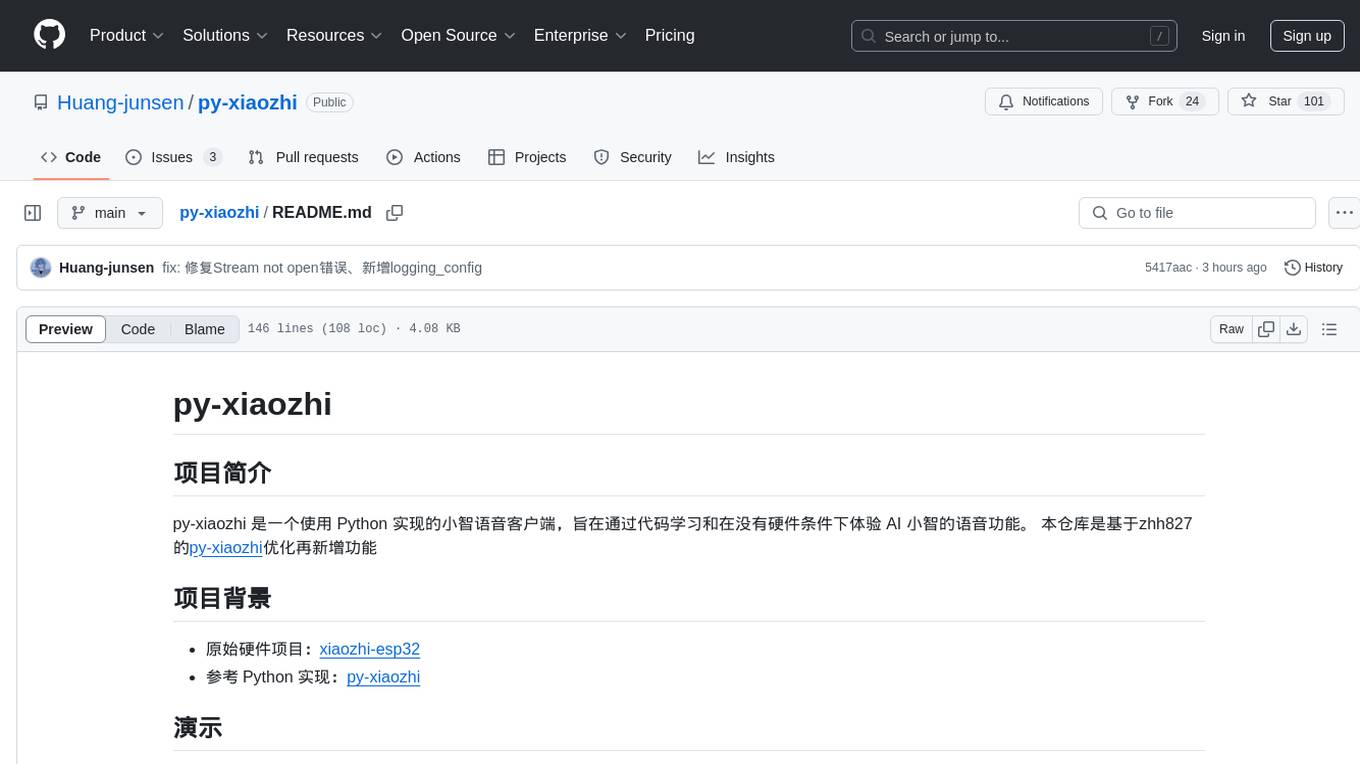
py-xiaozhi
py-xiaozhi is a Python-based XiaoZhi voice client designed for learning code and experiencing AI XiaoZhi's voice functions without hardware conditions. It features voice interaction, graphical interface, volume control, session management, encrypted audio transmission, CLI mode, and automatic copying of verification codes and opening browsers for first-time users. The project aims to optimize and add new features to zhh827's py-xiaozhi based on the original hardware project xiaozhi-esp32 and the Python implementation py-xiaozhi.
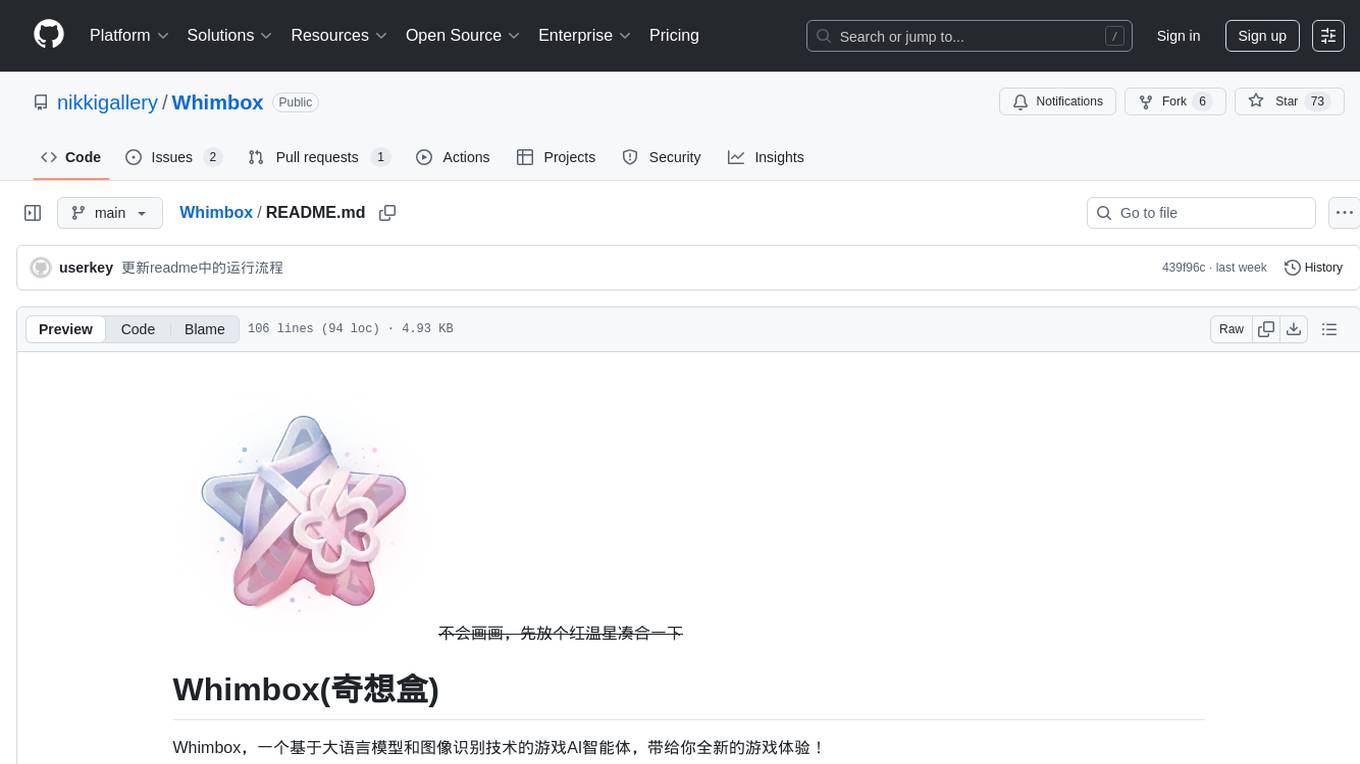
Whimbox
Whimbox is a game AI agent based on large language models and image recognition technology, providing users with a new gaming experience. It automates daily tasks such as mining, material collection, and wish checking, as well as features like route recording, image recognition, and AI dialogue. The tool does not modify game files or memory, only captures screenshots and simulates mouse and keyboard actions. It is designed for games running in a 1920x1080 windowed mode on mid to high-end PCs, with plans for future cloud gaming support. Whimbox is grateful to open-source projects like GIA and BetterGI, as well as AI models and programming tools like chatgpt and cursor. Developers interested in contributing to the project can join the development community and explore various functionalities that need development and adaptation.
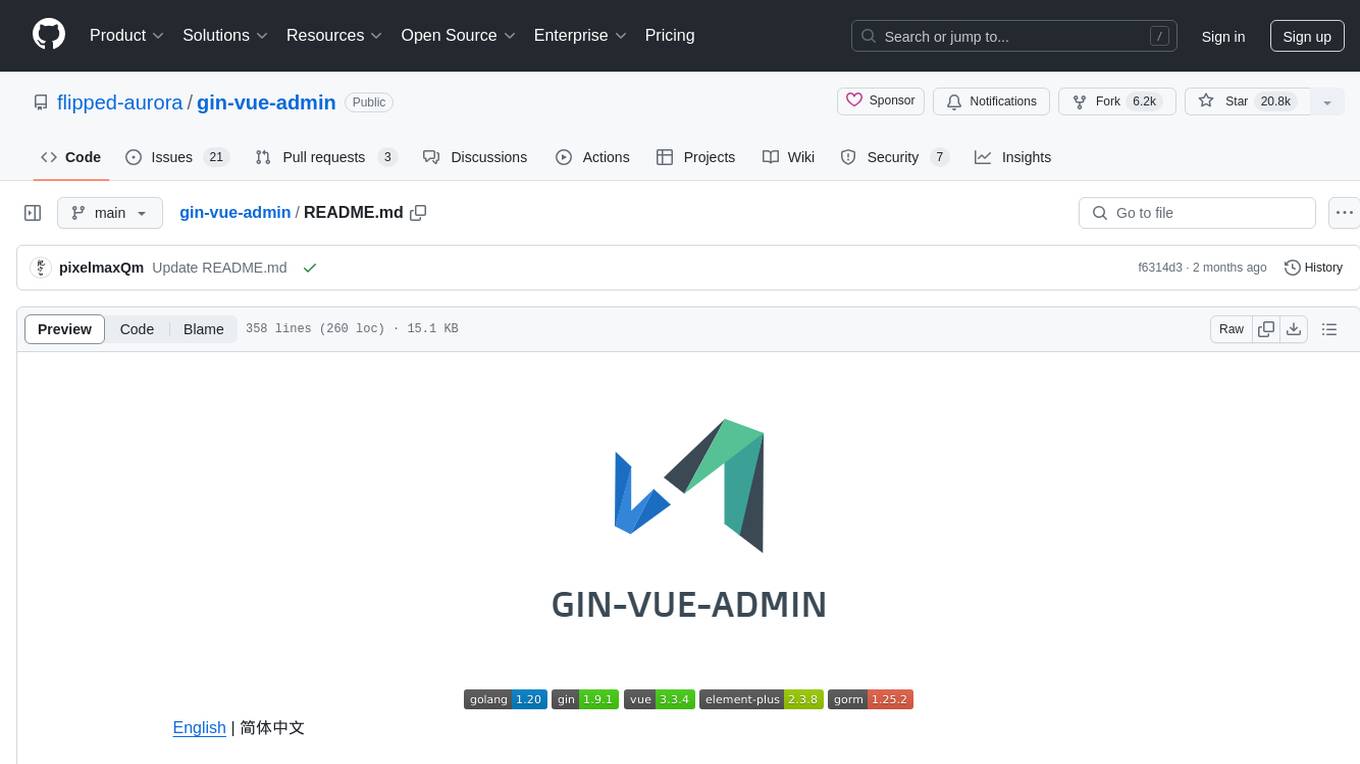
gin-vue-admin
Gin-vue-admin is a full-stack development platform based on Vue and Gin, integrating features like JWT authentication, dynamic routing, dynamic menus, Casbin authorization, form generator, code generator, etc. It provides various example files to help users focus more on business development. The project offers detailed documentation, video tutorials for setup and deployment, and a community for support and contributions. Users need a certain level of knowledge in Golang and Vue to work with this project. It is recommended to follow the Apache2.0 license if using the project for commercial purposes.
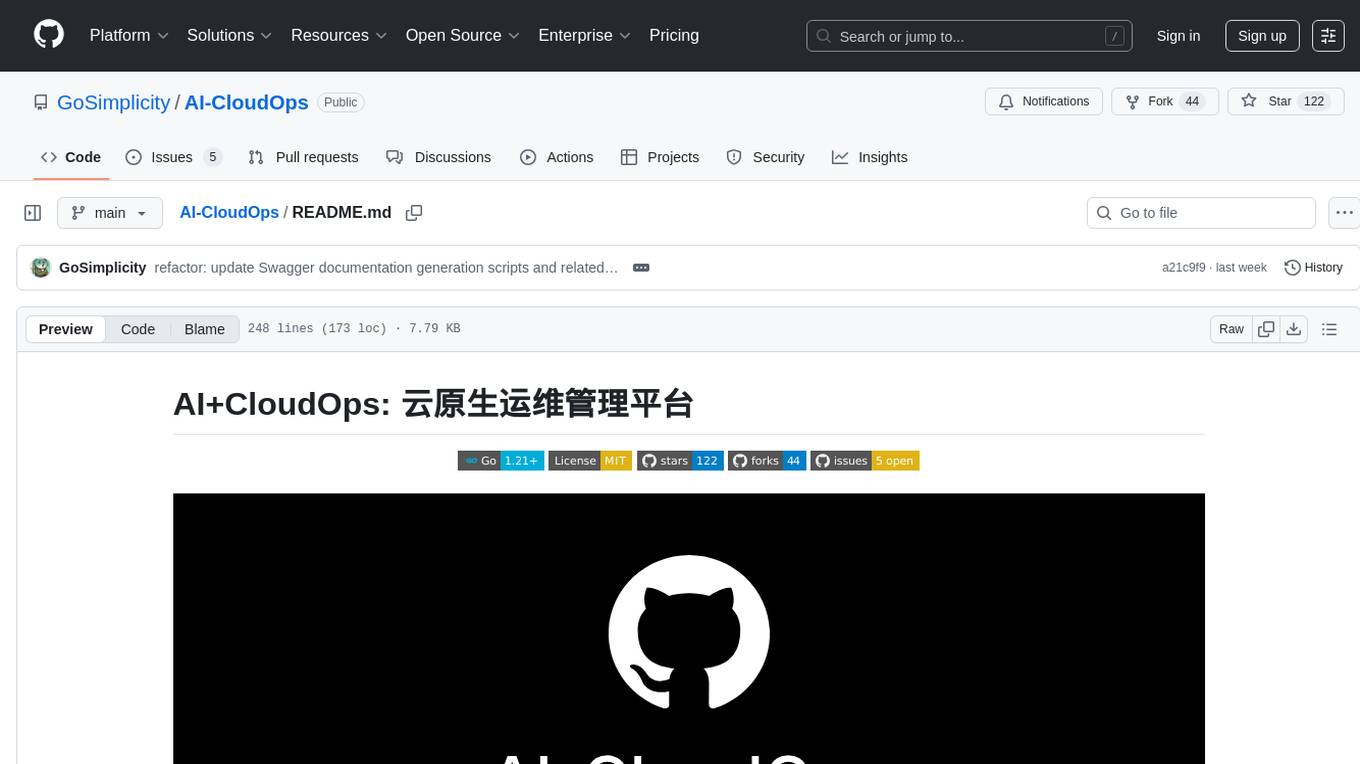
AI-CloudOps
AI+CloudOps is a cloud-native operations management platform designed for enterprises. It aims to integrate artificial intelligence technology with cloud-native practices to significantly improve the efficiency and level of operations work. The platform offers features such as AIOps for monitoring data analysis and alerts, multi-dimensional permission management, visual CMDB for resource management, efficient ticketing system, deep integration with Prometheus for real-time monitoring, and unified Kubernetes management for cluster optimization.
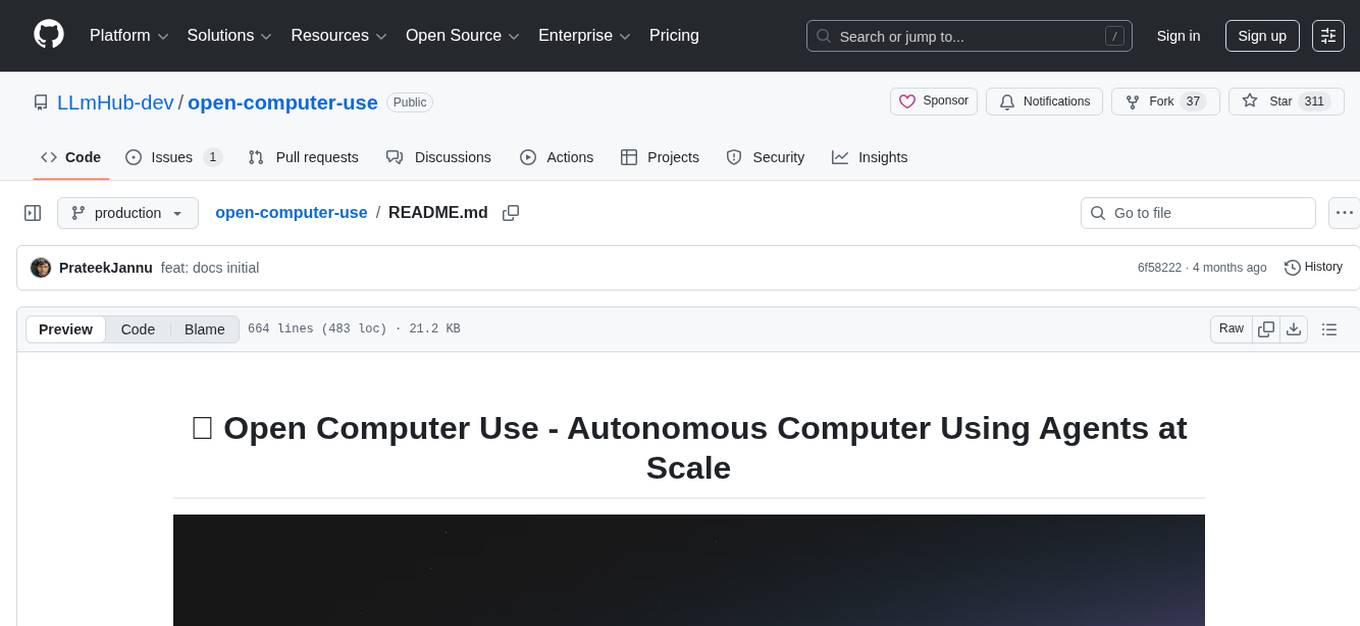
open-computer-use
Open Computer Use is an open-source platform that enables AI agents to control computers through browser automation, terminal access, and desktop interaction. It is designed for developers to create autonomous AI workflows. The platform allows agents to browse the web, run terminal commands, control desktop applications, orchestrate multi-agents, stream execution, and is 100% open-source and self-hostable. It provides capabilities similar to Anthropic's Claude Computer Use but is fully open-source and extensible.
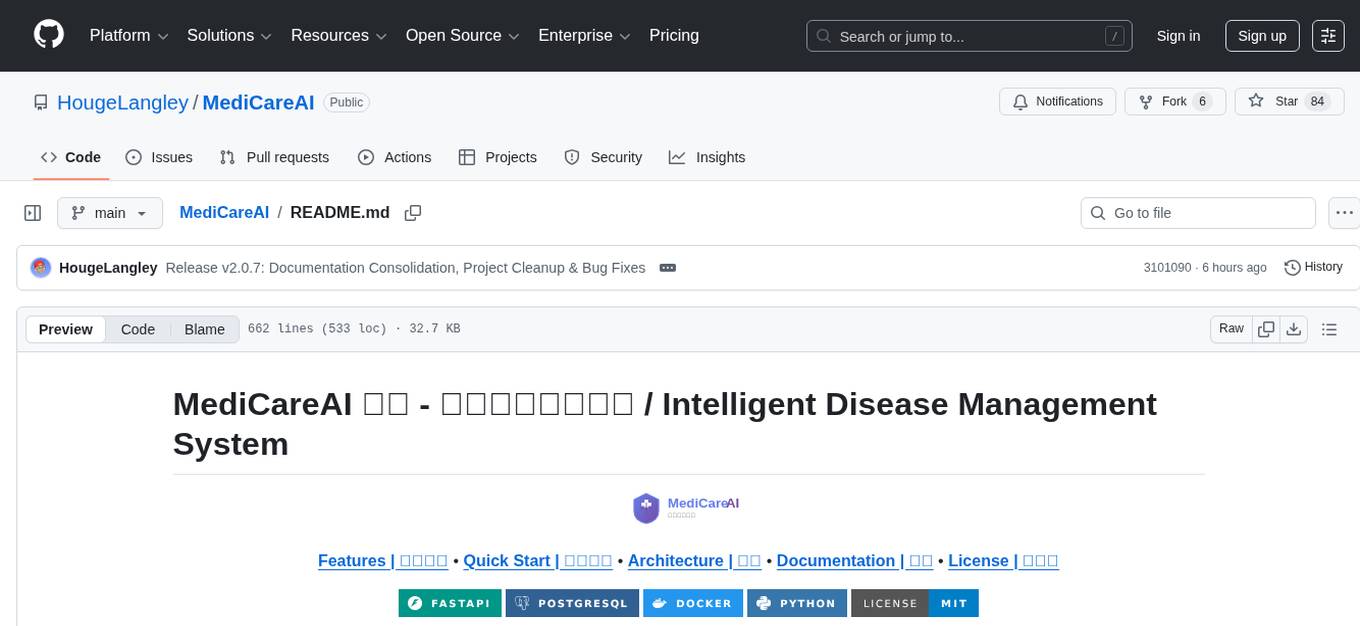
MediCareAI
MediCareAI is an intelligent disease management system powered by AI, designed for patient follow-up and disease tracking. It integrates medical guidelines, AI-powered diagnosis, and document processing to provide comprehensive healthcare support. The system includes features like user authentication, patient management, AI diagnosis, document processing, medical records management, knowledge base system, doctor collaboration platform, and admin system. It ensures privacy protection through automatic PII detection and cleaning for document sharing.
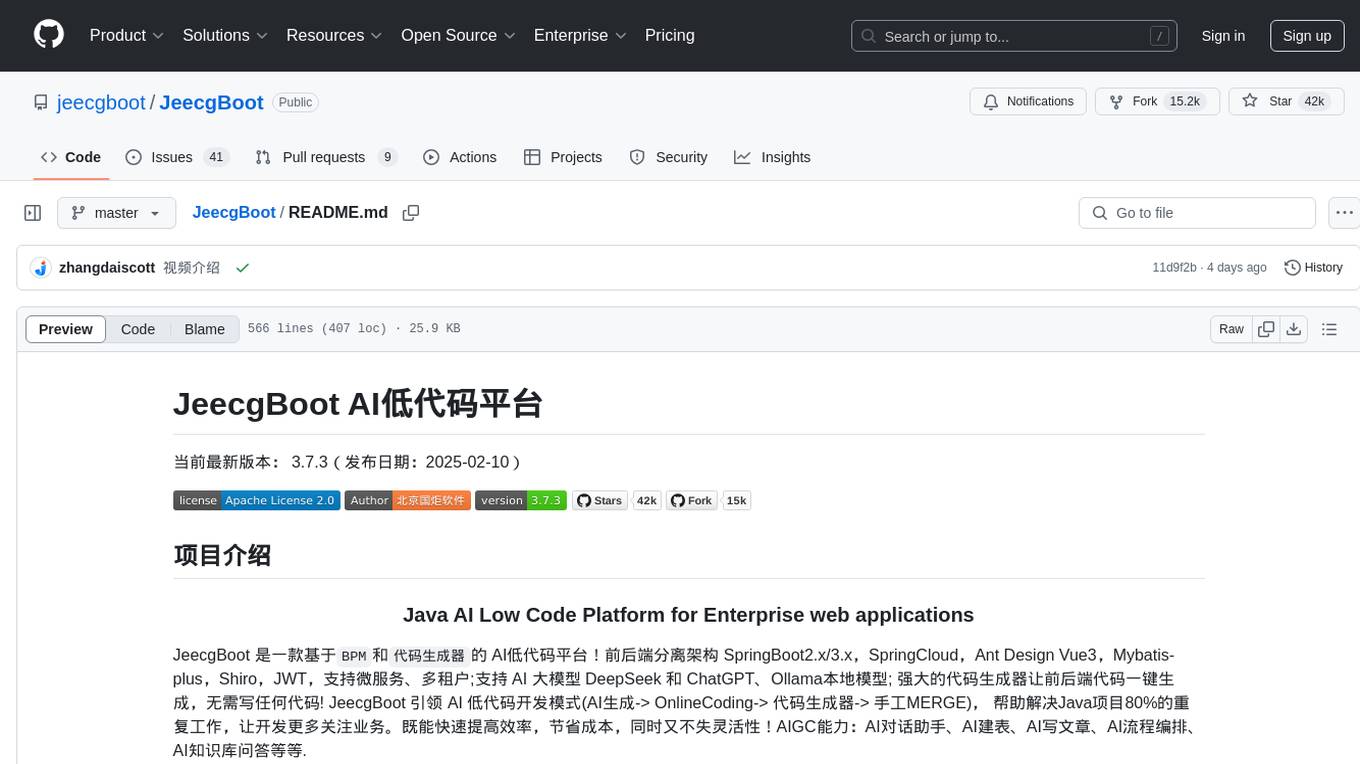
JeecgBoot
JeecgBoot is a Java AI Low Code Platform for Enterprise web applications, based on BPM and code generator. It features a SpringBoot2.x/3.x backend, SpringCloud, Ant Design Vue3, Mybatis-plus, Shiro, JWT, supporting microservices, multi-tenancy, and AI capabilities like DeepSeek and ChatGPT. The powerful code generator allows for one-click generation of frontend and backend code without writing any code. JeecgBoot leads the way in AI low-code development mode, helping to solve 80% of repetitive work in Java projects and allowing developers to focus more on business logic.
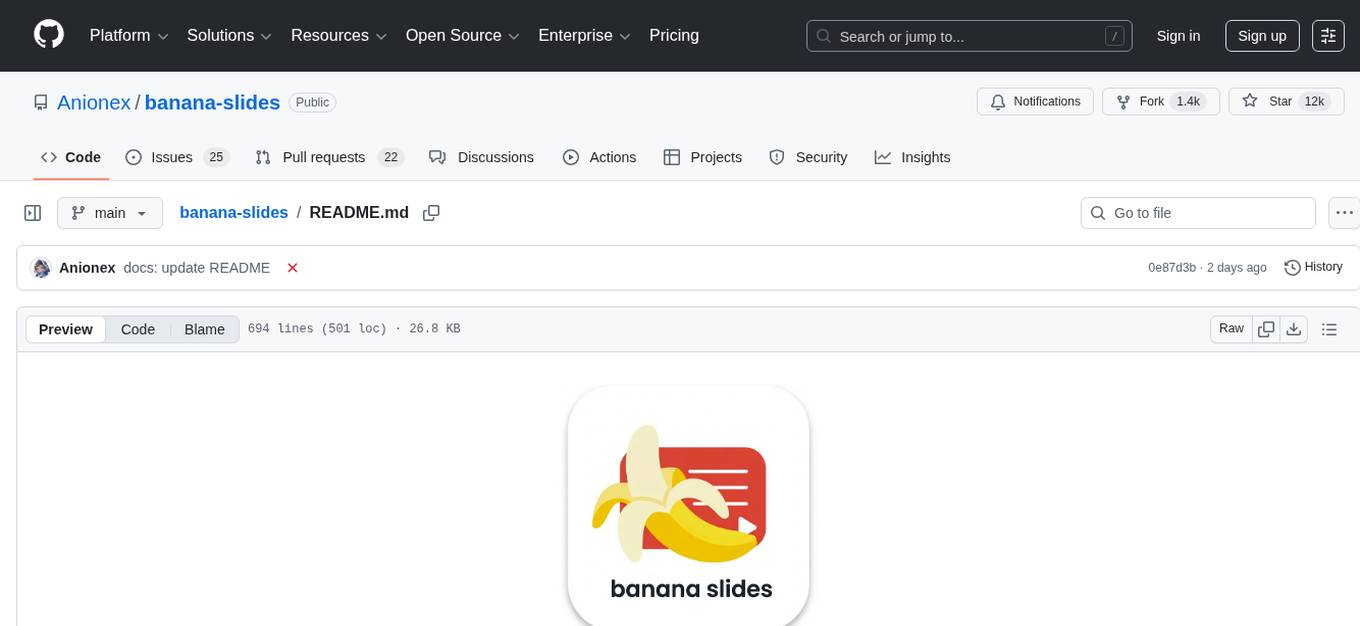
banana-slides
Banana-slides is a native AI-powered PPT generation application based on the nano banana pro model. It supports generating complete PPT presentations from ideas, outlines, and page descriptions. The app automatically extracts attachment charts, uploads any materials, and allows verbal modifications, aiming to truly 'Vibe PPT'. It lowers the threshold for creating PPTs, enabling everyone to quickly create visually appealing and professional presentations.
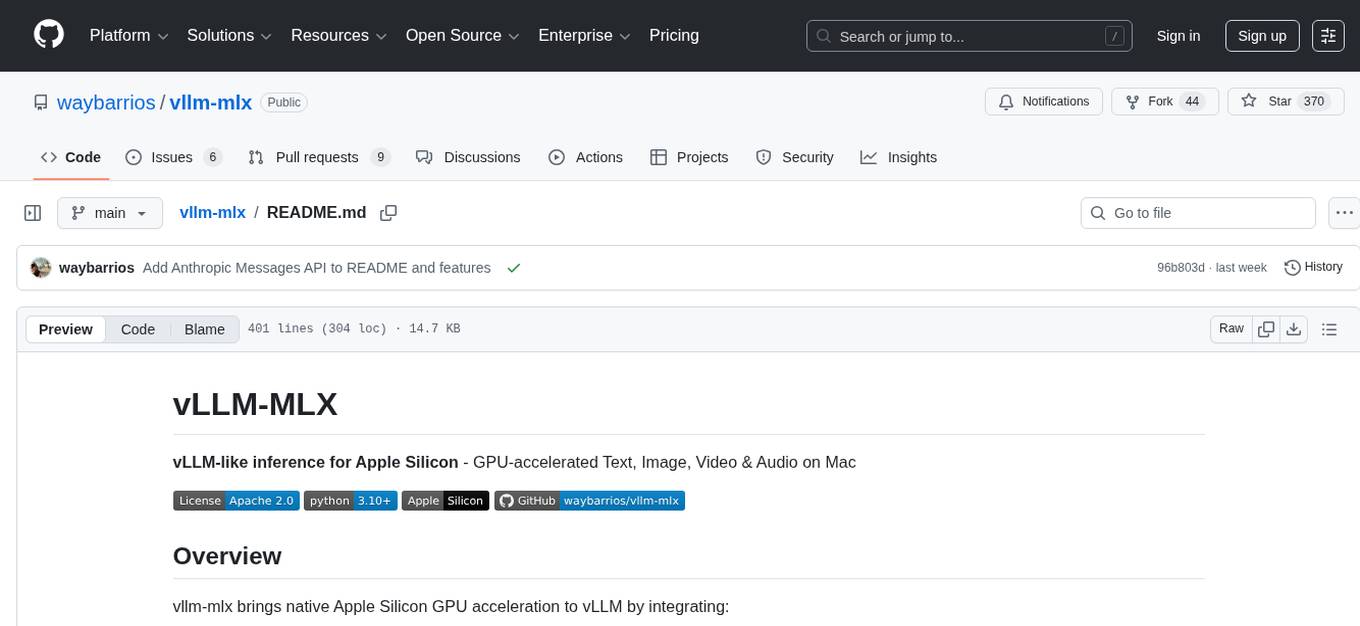
vllm-mlx
vLLM-MLX is a tool that brings native Apple Silicon GPU acceleration to vLLM by integrating Apple's ML framework with unified memory and Metal kernels. It offers optimized LLM inference with KV cache and quantization, vision-language models for multimodal inference, speech-to-text and text-to-speech with native voices, text embeddings for semantic search and RAG, and more. Users can benefit from features like multimodal support for text, image, video, and audio, native GPU acceleration on Apple Silicon, compatibility with OpenAI API, Anthropic Messages API, reasoning models extraction, integration with external tools via Model Context Protocol, memory-efficient caching, and high throughput for multiple concurrent users.
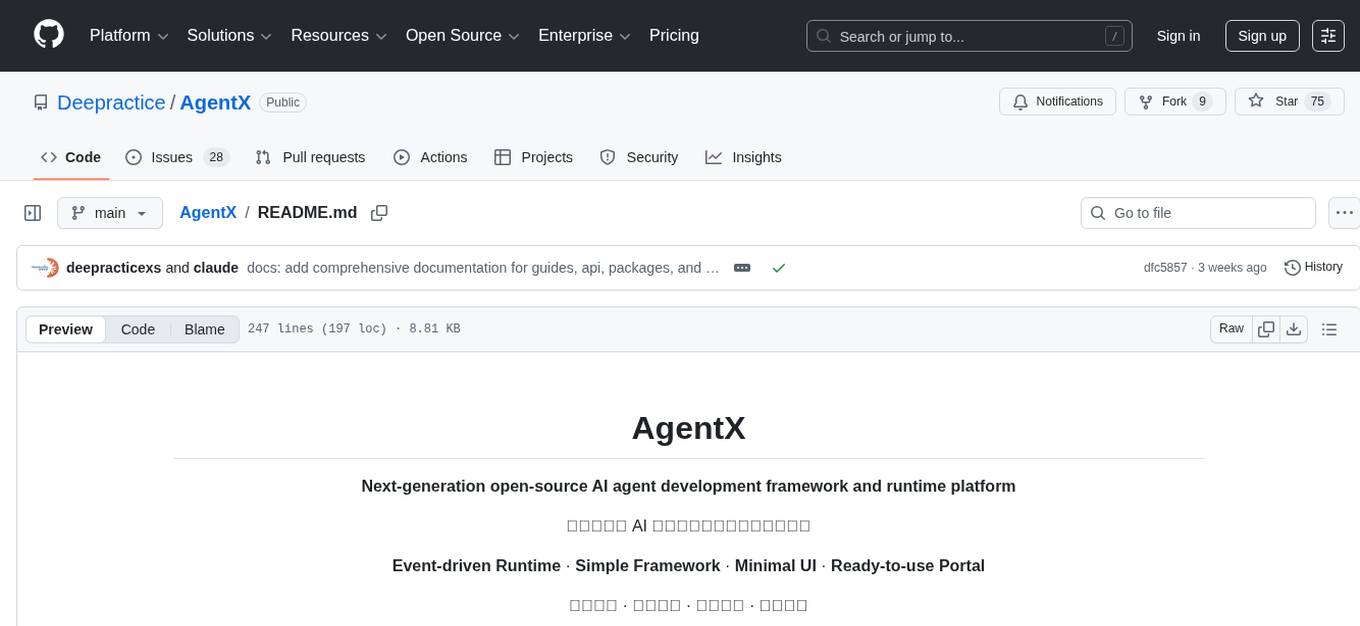
AgentX
AgentX is a next-generation open-source AI agent development framework and runtime platform. It provides an event-driven runtime with a simple framework and minimal UI. The platform is ready-to-use and offers features like multi-user support, session persistence, real-time streaming, and Docker readiness. Users can build AI Agent applications with event-driven architecture using TypeScript for server-side (Node.js) and client-side (Browser/React) development. AgentX also includes comprehensive documentation, core concepts, guides, API references, and various packages for different functionalities. The architecture follows an event-driven design with layered components for server-side and client-side interactions.
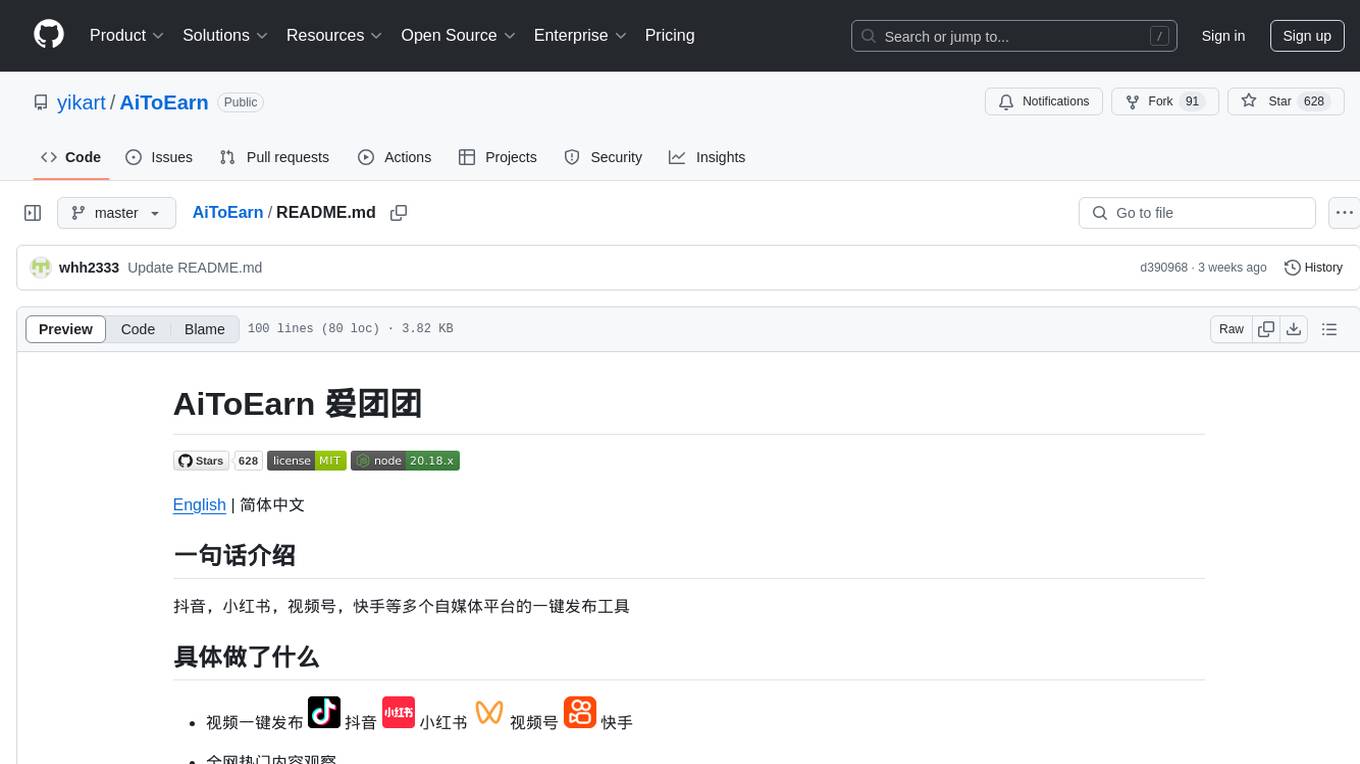
AiToEarn
AiToEarn is a one-click publishing tool for multiple self-media platforms such as Douyin, Xiaohongshu, Video Number, and Kuaishou. It allows users to publish videos with ease, observe popular content across the web, and view rankings of explosive articles on Xiaohongshu. The tool is also capable of providing daily and weekly rankings of popular content on Xiaohongshu, Douyin, Video Number, and Kuaishou. In progress features include expanding publishing parameters to support short video e-commerce, adding an AI tool ranking list, enabling AI automatic comments, and AI comment search.
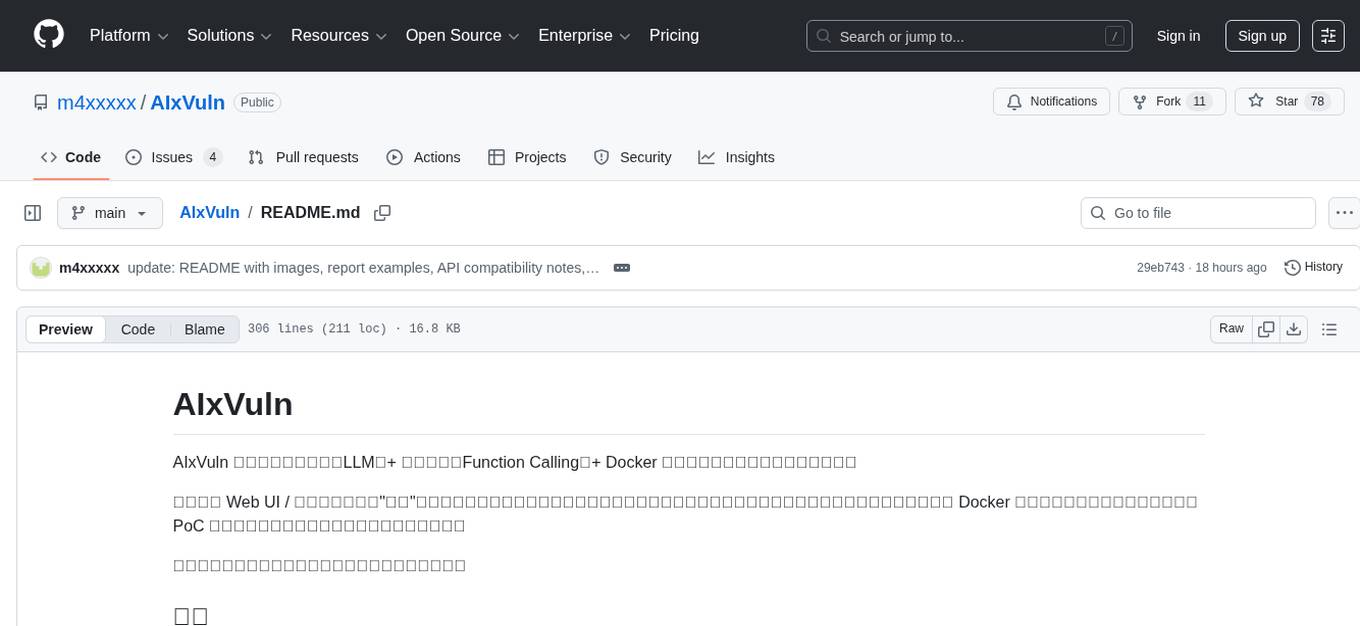
AIxVuln
AIxVuln is an automated vulnerability discovery and verification system based on large models (LLM) + function calling + Docker sandbox. The system manages 'projects' through a web UI/desktop client, automatically organizing multiple 'digital humans' for environment setup, code auditing, vulnerability verification, and report generation. It utilizes an isolated Docker environment for dependency installation, service startup, PoC verification, and evidence collection, ultimately producing downloadable vulnerability reports. The system has already discovered dozens of vulnerabilities in real open-source projects.
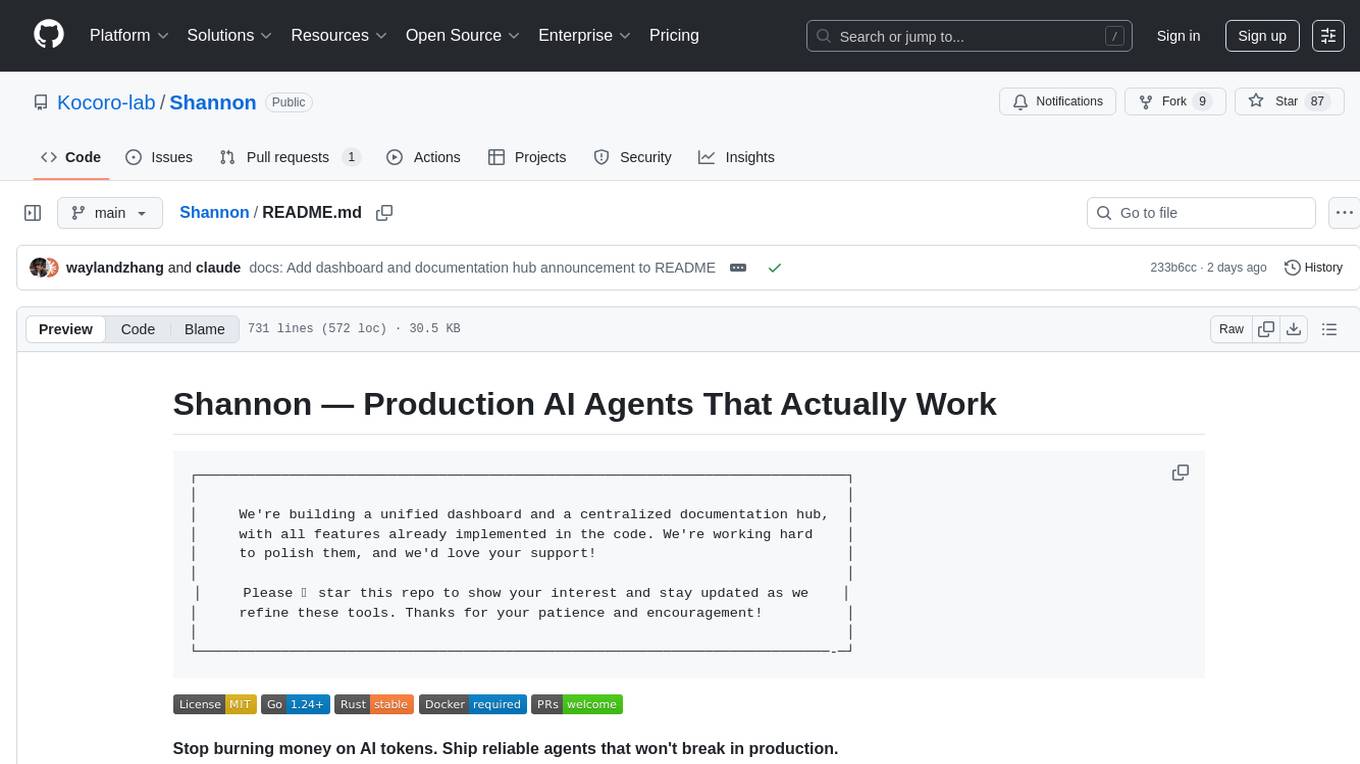
Shannon
Shannon is a battle-tested infrastructure for AI agents that solves problems at scale, such as runaway costs, non-deterministic failures, and security concerns. It offers features like intelligent caching, deterministic replay of workflows, time-travel debugging, WASI sandboxing, and hot-swapping between LLM providers. Shannon allows users to ship faster with zero configuration multi-agent setup, multiple AI patterns, time-travel debugging, and hot configuration changes. It is production-ready with features like WASI sandbox, token budget control, policy engine (OPA), and multi-tenancy. Shannon helps scale without breaking by reducing costs, being provider agnostic, observable by default, and designed for horizontal scaling with Temporal workflow orchestration.
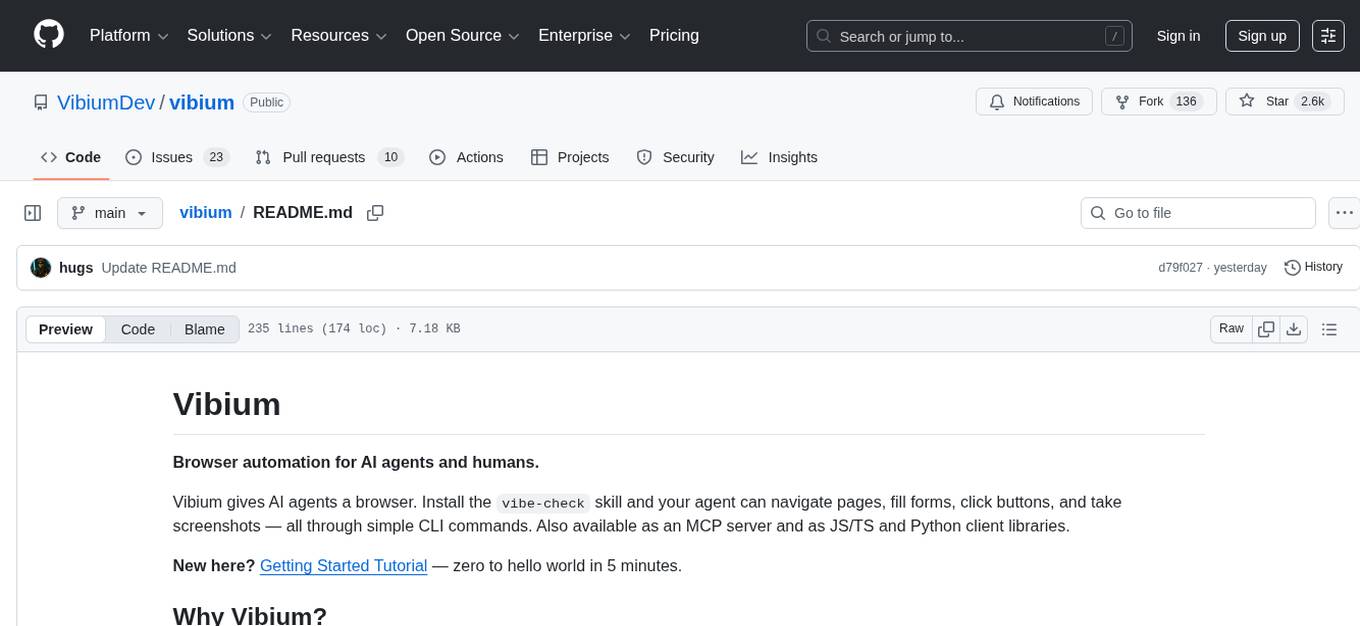
vibium
Vibium is a browser automation infrastructure designed for AI agents, providing a single binary that manages browser lifecycle, WebDriver BiDi protocol, and an MCP server. It offers zero configuration, AI-native capabilities, and is lightweight with no runtime dependencies. It is suitable for AI agents, test automation, and any tasks requiring browser interaction.
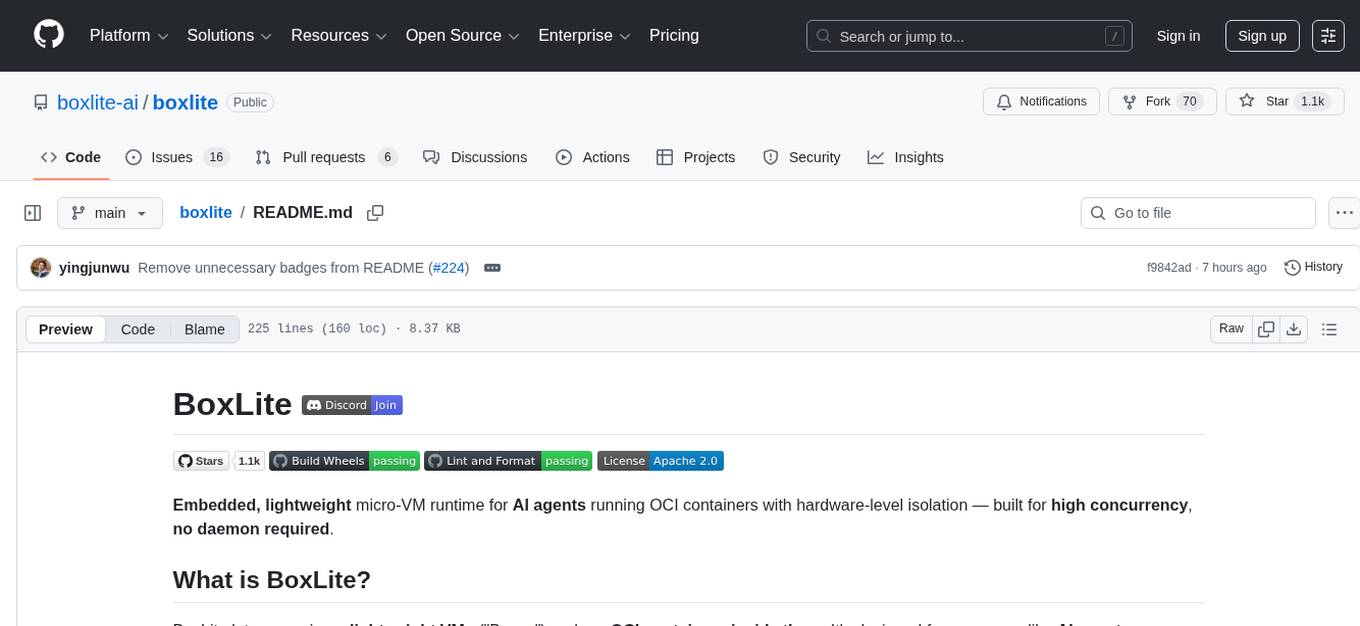
boxlite
BoxLite is an embedded, lightweight micro-VM runtime designed for AI agents running OCI containers with hardware-level isolation. It is built for high concurrency with no daemon required, offering features like lightweight VMs, high concurrency, hardware isolation, embeddability, and OCI compatibility. Users can spin up 'Boxes' to run containers for AI agent sandboxes and multi-tenant code execution scenarios where Docker alone is insufficient and full VM infrastructure is too heavy. BoxLite supports Python, Node.js, and Rust with quick start guides for each, along with features like CPU/memory limits, storage options, networking capabilities, security layers, and image registry configuration. The tool provides SDKs for Python and Node.js, with Go support coming soon. It offers detailed documentation, examples, and architecture insights for users to understand how BoxLite works under the hood.
For similar tasks

LLMStack
LLMStack is a no-code platform for building generative AI agents, workflows, and chatbots. It allows users to connect their own data, internal tools, and GPT-powered models without any coding experience. LLMStack can be deployed to the cloud or on-premise and can be accessed via HTTP API or triggered from Slack or Discord.

ai-guide
This guide is dedicated to Large Language Models (LLMs) that you can run on your home computer. It assumes your PC is a lower-end, non-gaming setup.

onnxruntime-genai
ONNX Runtime Generative AI is a library that provides the generative AI loop for ONNX models, including inference with ONNX Runtime, logits processing, search and sampling, and KV cache management. Users can call a high level `generate()` method, or run each iteration of the model in a loop. It supports greedy/beam search and TopP, TopK sampling to generate token sequences, has built in logits processing like repetition penalties, and allows for easy custom scoring.

jupyter-ai
Jupyter AI connects generative AI with Jupyter notebooks. It provides a user-friendly and powerful way to explore generative AI models in notebooks and improve your productivity in JupyterLab and the Jupyter Notebook. Specifically, Jupyter AI offers: * An `%%ai` magic that turns the Jupyter notebook into a reproducible generative AI playground. This works anywhere the IPython kernel runs (JupyterLab, Jupyter Notebook, Google Colab, Kaggle, VSCode, etc.). * A native chat UI in JupyterLab that enables you to work with generative AI as a conversational assistant. * Support for a wide range of generative model providers, including AI21, Anthropic, AWS, Cohere, Gemini, Hugging Face, NVIDIA, and OpenAI. * Local model support through GPT4All, enabling use of generative AI models on consumer grade machines with ease and privacy.

khoj
Khoj is an open-source, personal AI assistant that extends your capabilities by creating always-available AI agents. You can share your notes and documents to extend your digital brain, and your AI agents have access to the internet, allowing you to incorporate real-time information. Khoj is accessible on Desktop, Emacs, Obsidian, Web, and Whatsapp, and you can share PDF, markdown, org-mode, notion files, and GitHub repositories. You'll get fast, accurate semantic search on top of your docs, and your agents can create deeply personal images and understand your speech. Khoj is self-hostable and always will be.

langchain_dart
LangChain.dart is a Dart port of the popular LangChain Python framework created by Harrison Chase. LangChain provides a set of ready-to-use components for working with language models and a standard interface for chaining them together to formulate more advanced use cases (e.g. chatbots, Q&A with RAG, agents, summarization, extraction, etc.). The components can be grouped into a few core modules: * **Model I/O:** LangChain offers a unified API for interacting with various LLM providers (e.g. OpenAI, Google, Mistral, Ollama, etc.), allowing developers to switch between them with ease. Additionally, it provides tools for managing model inputs (prompt templates and example selectors) and parsing the resulting model outputs (output parsers). * **Retrieval:** assists in loading user data (via document loaders), transforming it (with text splitters), extracting its meaning (using embedding models), storing (in vector stores) and retrieving it (through retrievers) so that it can be used to ground the model's responses (i.e. Retrieval-Augmented Generation or RAG). * **Agents:** "bots" that leverage LLMs to make informed decisions about which available tools (such as web search, calculators, database lookup, etc.) to use to accomplish the designated task. The different components can be composed together using the LangChain Expression Language (LCEL).

danswer
Danswer is an open-source Gen-AI Chat and Unified Search tool that connects to your company's docs, apps, and people. It provides a Chat interface and plugs into any LLM of your choice. Danswer can be deployed anywhere and for any scale - on a laptop, on-premise, or to cloud. Since you own the deployment, your user data and chats are fully in your own control. Danswer is MIT licensed and designed to be modular and easily extensible. The system also comes fully ready for production usage with user authentication, role management (admin/basic users), chat persistence, and a UI for configuring Personas (AI Assistants) and their Prompts. Danswer also serves as a Unified Search across all common workplace tools such as Slack, Google Drive, Confluence, etc. By combining LLMs and team specific knowledge, Danswer becomes a subject matter expert for the team. Imagine ChatGPT if it had access to your team's unique knowledge! It enables questions such as "A customer wants feature X, is this already supported?" or "Where's the pull request for feature Y?"

infinity
Infinity is an AI-native database designed for LLM applications, providing incredibly fast full-text and vector search capabilities. It supports a wide range of data types, including vectors, full-text, and structured data, and offers a fused search feature that combines multiple embeddings and full text. Infinity is easy to use, with an intuitive Python API and a single-binary architecture that simplifies deployment. It achieves high performance, with 0.1 milliseconds query latency on million-scale vector datasets and up to 15K QPS.
For similar jobs

weave
Weave is a toolkit for developing Generative AI applications, built by Weights & Biases. With Weave, you can log and debug language model inputs, outputs, and traces; build rigorous, apples-to-apples evaluations for language model use cases; and organize all the information generated across the LLM workflow, from experimentation to evaluations to production. Weave aims to bring rigor, best-practices, and composability to the inherently experimental process of developing Generative AI software, without introducing cognitive overhead.

LLMStack
LLMStack is a no-code platform for building generative AI agents, workflows, and chatbots. It allows users to connect their own data, internal tools, and GPT-powered models without any coding experience. LLMStack can be deployed to the cloud or on-premise and can be accessed via HTTP API or triggered from Slack or Discord.

VisionCraft
The VisionCraft API is a free API for using over 100 different AI models. From images to sound.

kaito
Kaito is an operator that automates the AI/ML inference model deployment in a Kubernetes cluster. It manages large model files using container images, avoids tuning deployment parameters to fit GPU hardware by providing preset configurations, auto-provisions GPU nodes based on model requirements, and hosts large model images in the public Microsoft Container Registry (MCR) if the license allows. Using Kaito, the workflow of onboarding large AI inference models in Kubernetes is largely simplified.

PyRIT
PyRIT is an open access automation framework designed to empower security professionals and ML engineers to red team foundation models and their applications. It automates AI Red Teaming tasks to allow operators to focus on more complicated and time-consuming tasks and can also identify security harms such as misuse (e.g., malware generation, jailbreaking), and privacy harms (e.g., identity theft). The goal is to allow researchers to have a baseline of how well their model and entire inference pipeline is doing against different harm categories and to be able to compare that baseline to future iterations of their model. This allows them to have empirical data on how well their model is doing today, and detect any degradation of performance based on future improvements.

tabby
Tabby is a self-hosted AI coding assistant, offering an open-source and on-premises alternative to GitHub Copilot. It boasts several key features: * Self-contained, with no need for a DBMS or cloud service. * OpenAPI interface, easy to integrate with existing infrastructure (e.g Cloud IDE). * Supports consumer-grade GPUs.

spear
SPEAR (Simulator for Photorealistic Embodied AI Research) is a powerful tool for training embodied agents. It features 300 unique virtual indoor environments with 2,566 unique rooms and 17,234 unique objects that can be manipulated individually. Each environment is designed by a professional artist and features detailed geometry, photorealistic materials, and a unique floor plan and object layout. SPEAR is implemented as Unreal Engine assets and provides an OpenAI Gym interface for interacting with the environments via Python.

Magick
Magick is a groundbreaking visual AIDE (Artificial Intelligence Development Environment) for no-code data pipelines and multimodal agents. Magick can connect to other services and comes with nodes and templates well-suited for intelligent agents, chatbots, complex reasoning systems and realistic characters.



